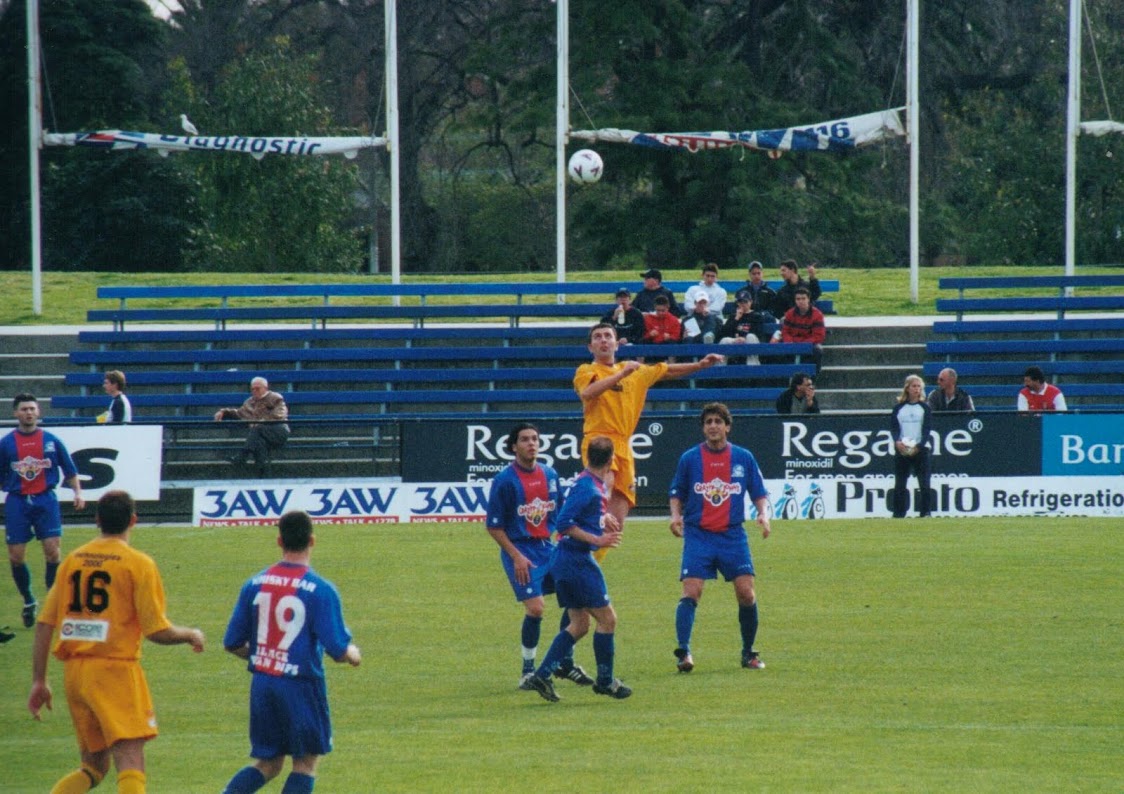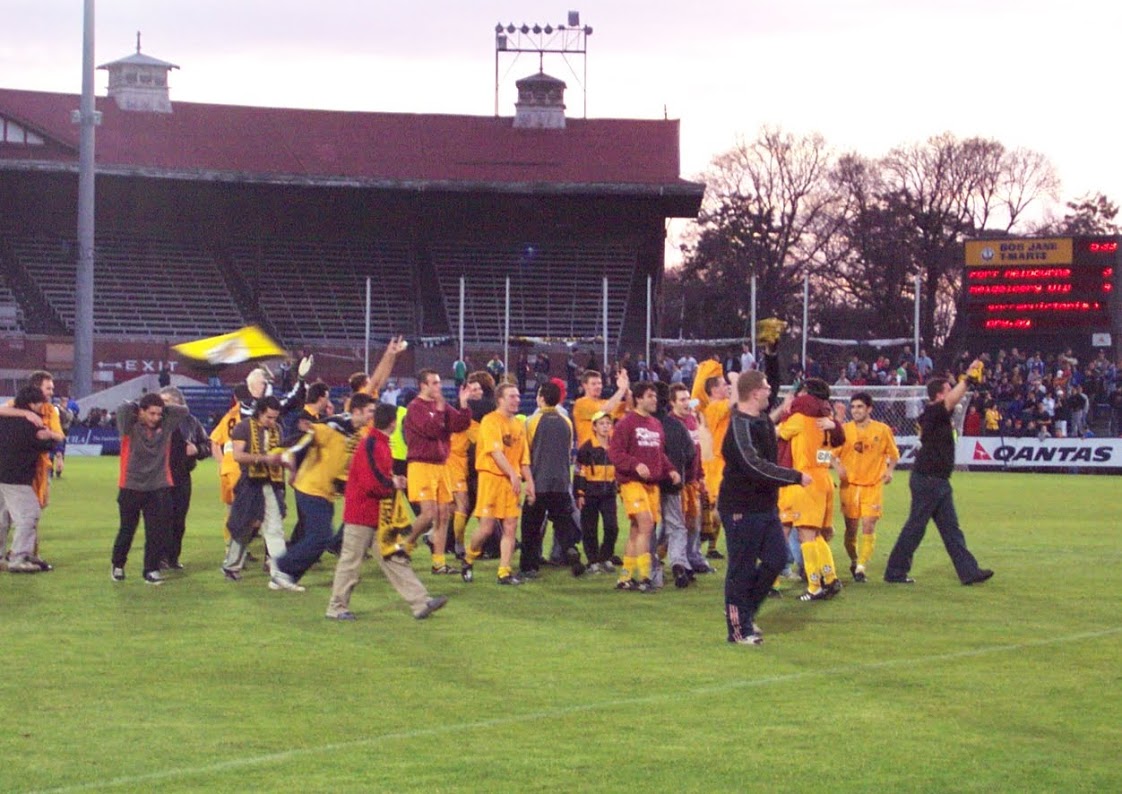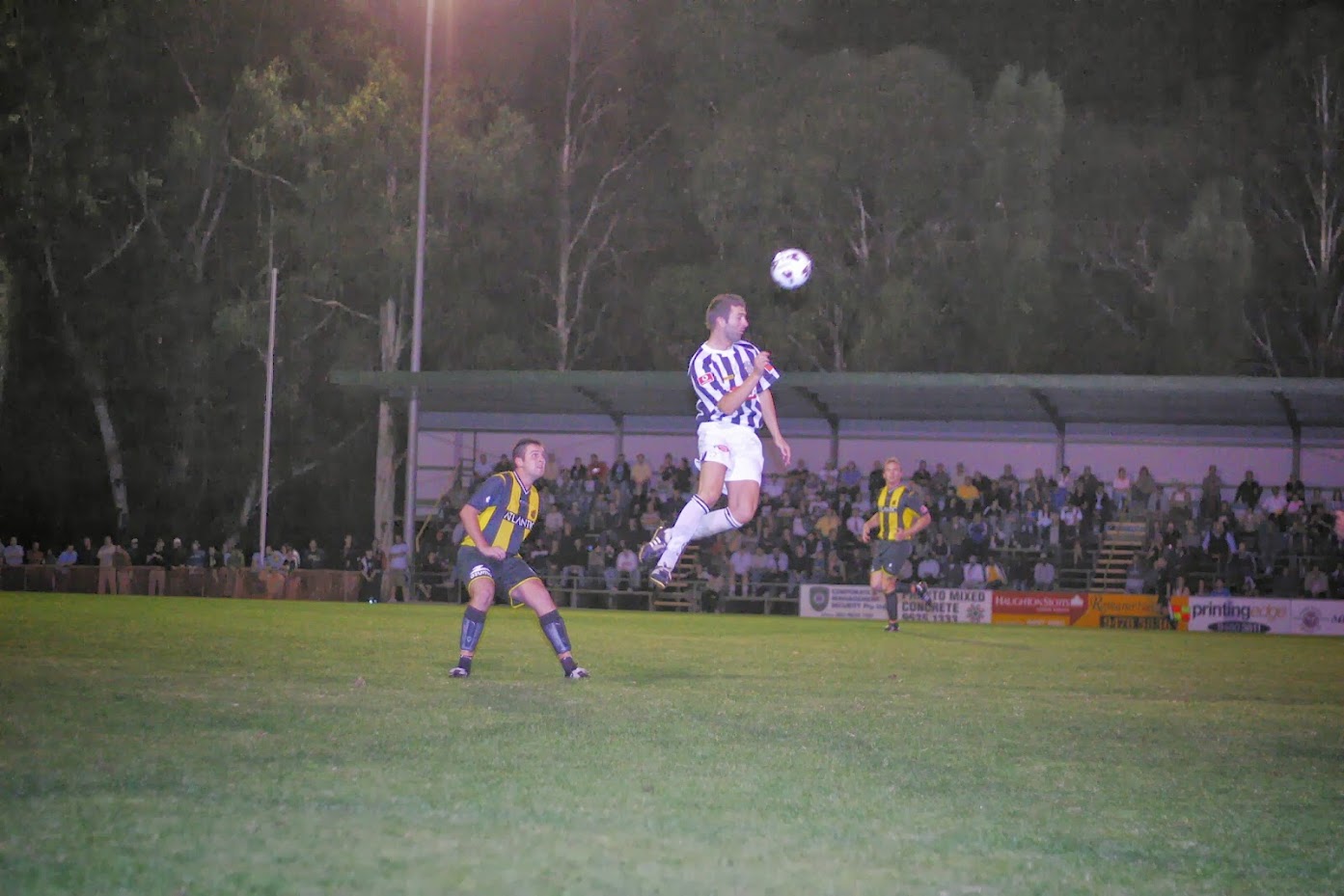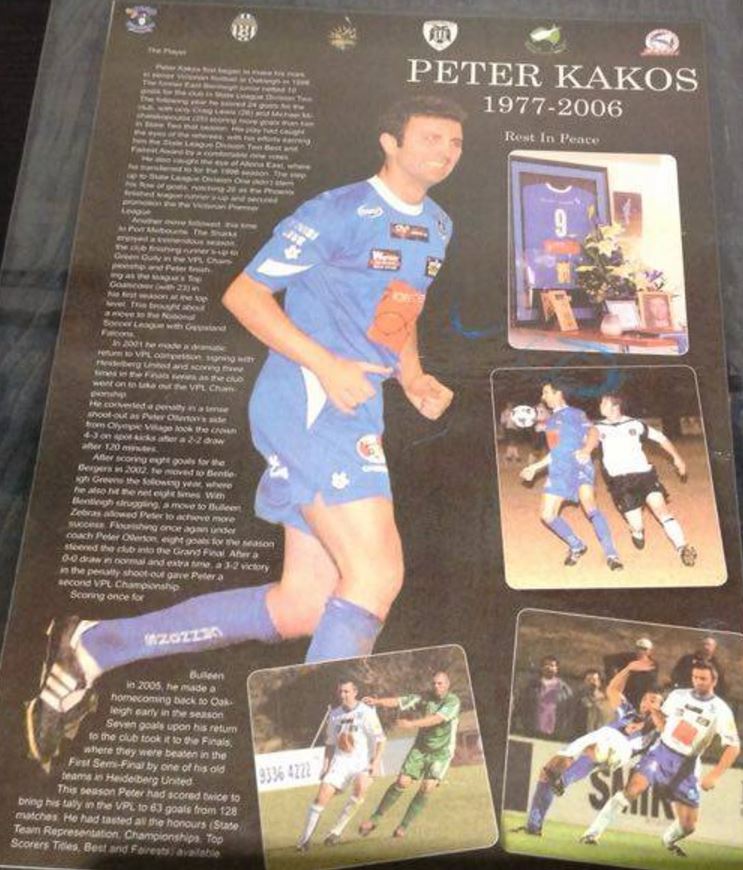Think of some of the great strikers to wear the number nine jersey in the VPL/NPL and the likes of Milos Lujic at South Melbourne, Luke Sherbon at Dandenong Thunder and Trent Rixon during his Northcote days come to mind.
Oakleigh Cannons have had many talented strikers on their books in recent times, but none have worn #9. Not since 2006. A lot has changed in Victorian football in 10 years, but that number remains indefinitely reserved for one of the club’s favourite sons.
Peter Kakos should have been enjoying a post-playing career today, reflecting on his achievements in Victorian football – including multiple VPL titles, a golden boot, state representation and an NSL stint – as he approached his 40s.
He remains a revered figure in local circles, remembered as a popular figure and a gifted forward, a name that often appeared in discussions about the finest players in the state’s top flight.
“My memories of him were of a great player and a great person who got along well with everyone and had a good personality and character about him. Stuart Munro said he was one of the best strikers he had ever worked with, and that’s saying something,” Oakleigh Cannons general manager Aki Ionnas recalls.
Born on August 29, 1977, the Bentleigh junior made his mark in the state leagues before working his way up the footballing heirarchy.
Between 1996 and 1997, a senior breakthrough at Oakleigh in State League Two acted as the launchpad for the teenager, who scored 33 goals across two seasons in his stint at Jack Edwards Reserve, earning best and fairest honors in the process. He further enhanced his stocks with a stint at Altona East Phoenix, netting 26 times in State One in 1998 as the side finished second to secure promotion to the VPL.
Kakos then once more made another step up to the VPL, but it was his stint with Port Melbourne Sharks in 1999 – coached by Peter Tsolakis – that brought him to national attention.
Banging in 23 goals as a 21-year-old, he emphatically claimed the golden boot as the Sharks finished in second spot behind Green Gully Cavaliers.
Kakos’ haul proved to be one of the most prolific of his era, as the next time anybody scored 20 or more was Pablo Cardozo in 2008 with Richmond, while only Milos Lujic came next in 2014/15 – yet both successors achieved the feat once the state’s premier competition increased from a 22-game season to 26.
Kakos and Rodrigo Vargas were two names to graduate from Port Melbourne to the national stage following that season. A 21-year-old Vargas joined Melbourne Knights, whereas a 22-year-old Kakos signed with Gippsland Falcons – former home of Archie Thompson, who made the move to Carlton the season prior – where he played alongside the likes of Bojo Jevdjevic, Mehmet Durakovic, Brian MacNicol, Andy Vargas and John Hutchinson.
The writing was on the wall for the club that finished second last in its final season before disbanding in 2001, with Kakos featuring 19 times before departing Morwell’s Mobil Park.
He returned to the VPL with Heidelberg United in 2001, playing under former Socceroo Peter Ollerton in a championship-winning season. The striker faced off against his former side Port Melbourne in the final. One familiar face from that game was teammate Eric Vassiliadis, who now coaches the side he defeated as a player in 2001.
In the grand final, George Georgiadis and current Moreland Zebras man Mile Medjedovic had the Bergers up 2-0, but a Peter Psarros strike – who that season won both the Golden Boot and Jimmy Rooney medal (and is now known as the owner of Smile for Peter photography) – and a Peter Tsolakis cross turned in by Cameron Brown for an own goal had the scores level at 2-2. Jim Kourtis then made two saves as Heidelberg went on to win the final on penalties, with Kakos featuring on the scoresheet in the shootout.
“He danced ballet on the park, not a big build but he was so slick and so smooth,” Medjedovic remembers.


Three games into the 2002 season and Heidelberg had lost their opening games 5-1 to Altona Magic, 4-1 to Preston Lions and 6-3 to Port Melbourne in the grand final replay. Ollerton departed and found himself coaching Bulleen Zebras later that year.
Kakos stayed on, but his last game came in Round 17 as Heidelberg went from winning the VPL to being relegated the next year. He left after 13 goals in 29 games, making the switch to Bentleigh Greens in 2003.
In a mostly forgettable stint at Kingston Heath, the Greens finished third last, though Kakos netted a respectable nine times in 21 games.
The striker then switched to the Zebras in 2004, linking up again with Ollerton and featuring alongside future A-League players Michael Theoklitos and Billy Celeski.

Having finished third in the league behind Green Gully and Oakleigh, the Zebras faced off against fifth-placed Altona Magic in the final. While the game went without a goal in regulation time – Kakos replaced by Marino Gasparis in the 95th minute – the Zebras won on penalties, Michael Theoklitos the hero after making three saves. He was off to Melbourne Victory the next year, while Billy Celeski jetted off to Perth Glory.
The occasion marked Kakos’ second VPL title – both penalty wins – under the guidance of Ollerton.
He started next season still at the Zebras, scoring the opening goal in a first round draw with Fawkner-Whittlesea. However, similarly to the Heidelberg situation, the club struggled to back up a championship, picking up two points in the first four rounds. Kakos didn’t feature in Round 5, and by Round 6 he left Bulleen after nine goals in 23 games, joining Oakleigh Cannons and playing alongside the likes of Nick Tolios, Stuart Webster, Antun Kovacic, Steve Laurie and Felix Rosman, who were then coached by Mike Chatzitrifonas.
“As a person I remember his sense of humour – he was witty, genuine and authentic. He also at times was like an old Greek man in a young man’s body,” Tolios, who is now Kingston City coach, says.
“As a player, Peter was a clinical and very creative striker. Technically very gifted. He wasn’t the quickest, but always found time on the ball and glided around the ground. For a taller player he had great close control and very skillful.
“But his main trait was being able to put the ball in the back of the net – either with his head, left foot or right foot. And he was never shy to tell you how he scored.”
By Round 9 – a 2-1 loss to Altona – Chatzitrifonas was gone, replaced by Stuart Munro. Oakleigh finished fifth before being knocked out by a Phil Stubbins-led Heidelberg United in finals.
While Oakleigh was where Kakos’ senior journey began, tragically it would also be where it ended.
In 2006, 24 hours after a Monday night game against Bulleen Zebras on May 8, Kakos was found collapsed in his taxi before being rushed to hospital.
He was in a coma and required brain surgery at the time of Oakleigh’s 4-1 win over Frankston Pines on the Friday; teammates dedicating the win to him, buoyed by reported improvements in Kakos’ condition. However, he passed away after the weekend at the Alfred hospital.
“I remember it very clearly as we had played Bulleen on the Monday night and he had played on that evening. We were at training the next day or so and someone said Peter had collapsed at work and was in hospital,” Ionnas says.
“That night after training I visited him at hospital and he was falling in and out of consciousness. We played Frankston on the Friday night and dedicated our win to him as we heard his condition was improving and he was expected to make a full recovery – which is what I informed the players, coaches and committee.
“He went into theatre on Sunday afternoon and despite suffering a few strokes he was still expected to recover from it. The following day we had training and brought in a counsellor to talk to the players and committee and let them know everything was going to be fine as we had been expecting Peter to be discharged soon.
“I then got a text and call notifying me that he was in his last hours and was not going to making it. I called Stuart Munro over and explained to him what had happened and advised him to stop training immediately. Everyone was on the ground in tears upon hearing the news and we all went to the Alfred Hospital to say our last goodbyes.
“We cancelled all club games that week in what was a very sad experience in a very sad year for us. From that day I decided to retire the number nine jersey in his honour and since then no player has worn it as he is someone who will never be forgotten at this club and will always be in our memory.”

A misdiagnosed brain abscess cut Kakos down in the prime of his life. It was a death that sent shockwaves among the Victorian football community.
“I was absolutely shocked and in disbelief. You naturally become close to your teammates during the course of the season, but the camaraderie that we had developed that championship year was something special, which made the news even more tragic,” Medjedovic says.
Despite racing to the VPL premiership, taking first place by eight points over second placed Altona Magic, Oakleigh lost in straight sets in the finals to Altona and then Heidelberg United – a solitary Andy Vlahos goal sinking the Cannons in extra time.
Investigations in 2010 by the Victorian coroner found that a “’systemic lack of communication’ between hospital staff, the absence of key surgery staff, and misdiagnosis contributed to his death, and that Peter Kakos should not have died”.
It was little consolation for his family and for football in the state, which had lost a highly-regarded striker with more than 10 years of senior playing experience, 62 VPL goals, and almost 120 senior goals across all leagues.
Ten years on, a photo of Kakos hangs in the clubrooms at Jack Edwards Reserve. His memories remain in the minds of footballers, coaches, fans and friends who were able to witness the prolific striker weave his magic on the pitch.
All images Football Chaos unless stated. With thanks to Ozfootball.net

